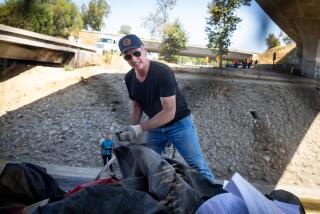Wilson Favors Wait for Welfare : Budget: Governor says delaying aid for newcomers would slow influx of poor. He suggests U.S. ease mandates on states to help.
- Share via
SACRAMENTO — Gov. Pete Wilson says he would like to deny public health and welfare benefits to new California residents, perhaps for as long as three years, in order to discourage poor people from moving to the state.
The Republican chief executive, in an interview to be published in Monday’s issue of Time magazine, also suggests that the federal government relax its “mandates” requiring the states to provide a minimum level of services to the needy.
“We will have to minimize the magnetic effect of the generosity of this state,” Wilson says in the interview, which is part of a special issue of the magazine devoted entirely to California’s problems. “There is a limit to what we can absorb.”
Wilson notes that courts have forbidden states from establishing waiting periods during which newcomers cannot receive public assistance.
“I happen to think those cases are wrong,” Wilson says. “It seems to me that at the very least there should be a period in which new residents do not receive the benefits that the state provides. People have talked about a three-year waiting period. Otherwise, you have a situation in which you are risking the health of your economic base.”
Bill Livingstone, the governor’s press secretary, said Friday that the Administration does not know what percentage of welfare recipients are new residents of California. But he said it stands to reason that the poor move here to take advantage of higher benefits.
A woman with two children in the Aid to Families With Dependent Children program now receives $663 a month. In Texas, the payments are less than $200 a month.
“In the 1980s, even though we were having boom economic times, when you expect safety net programs to decrease, there’s been an increase in demand for these types of services,” Livingstone said. “That’s the magnetic effect that is attracting others from states where the benefits are lower.”
Studies by state agencies have failed to substantiate that theory.
A 1984 report by the nonpartisan legislative analyst found that children receiving AFDC were more likely to be born in California than children who were not receiving public assistance. A 1990 study by the state Department of Social Services cited several reasons for the growing welfare caseload but did not mention migration from out of state.
As for the federal mandates, Wilson says in the interview that Californians are “having to pay a disproportionate share of the national burden” for supporting the poor.
“What we are going to have to do, I think, is either make an internal decision to be less generous or, better, ask the federal government--notably the Congress--to give some relief on these mandates, because their good intentions are threatening the stability of even rich states like California,” the governor says.
Livingstone said Wilson was referring to federal law prohibiting states from reducing their AFDC grants to levels below that paid in 1988. He said the governor is chagrined that the federal government has delayed reimbursing the state for aid to newly legalized citizens. But he said Wilson would not favor withdrawing that aid even if Congress dropped its requirement.
“He just means that that is another mandate that is driving up costs,” Livingstone said.
Wilson was criticized this year for suggesting that his proposed 8.8% cut in payments to poor mothers would deprive them of only a “six-pack of beer.” He acknowledges in the interview that his latest comments are likely to rekindle that sort of criticism.
“People immediately will say, ‘You’re anti-poor people,’ ” Wilson says. “I’ll be accused of racism.”
More to Read
Get the L.A. Times Politics newsletter
Deeply reported insights into legislation, politics and policy from Sacramento, Washington and beyond. In your inbox twice per week.
You may occasionally receive promotional content from the Los Angeles Times.










